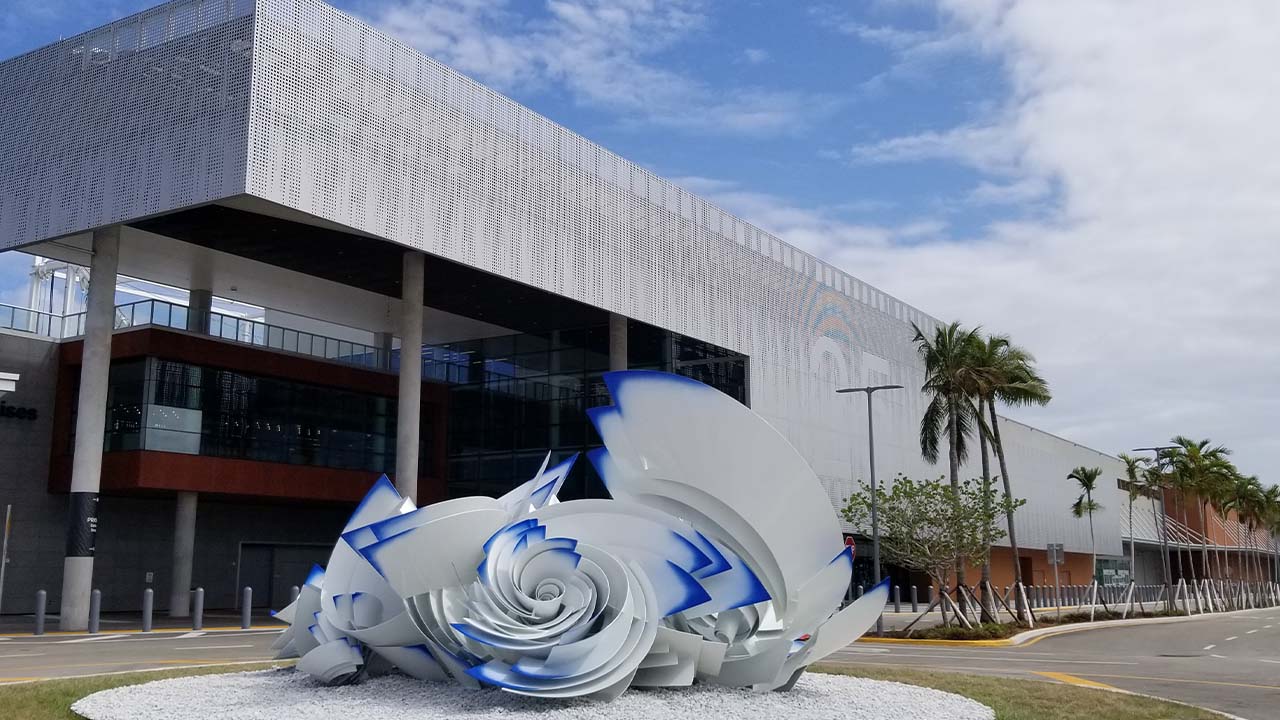Leslie Fordham, Broward Cultural Division’s public art administrator since 2010, unintentionally honed her craft in a most unusual way.
“I sewed,” says Fordham. “I made dresses when I was a teenager and in my 20s, and I learned a whole lot about how sculpture goes together and how they make sculpture from those days when I did sewing. I made my own dresses because I liked going to a lot of parties.”
Early in Fordham’s career, she worked with engineers and says that’s how the pieces came together.
“What I don’t usually tell people: I worked then in the construction business and I learned how a barrel vault worked because it was pretty much the same as putting a sleeve in a dress,” she says. “There was a time I went and talked to architects, and they called my company and asked if I was an engineer because I seemed to know so much about how things work together.”
Also, Fordham “learned about planning and planning out a project.” Those were skills, she says, she was able to apply working in public art.
Fordham, 66, retired from her position with Broward County on Friday, Sept. 13.
She grew up in Washington, D.C., where she says, “my parents were great art lovers. They took us to art museums.”
After visits to the National Gallery of Art, Fordham “came to love” the paintings of French Baroque artists Nicolas Poussin and Claude Lorrain and of the 19th century impressionists.
She studied art and art history at St. Mary’s College of Maryland and earned a Master of Arts in information management at University of West London in the United Kingdom.
In August 2000, Fordham moved to Vail, Colorado, to run the town’s Art in Public Places program.
“What I learned in Vail – and was able to apply here – is that it’s so important to ask people what they want, what they want to see. Let them know in advance what you’re planning. And those community outreach skills are essential,” says Fordham. “In a bigger community like this, the planning process is slightly different in that one needs to anticipate who’s going to have a stake in the public art, and think about who has questions, and be sure that you’re connecting with those folks in advance.”
After nine years in Vail, Fordham accepted the job of public art manager in Lancaster, Pa. A year later, she moved to Broward County and in August 2010 joined the cultural division as the county’s public art administrator.
“When I first came, there was still that bit of an economic downturn. There were questions about the future of our public art ordinance,” says Fordham.
She managed to handle both the economic and political challenges.
“I learned so much about public art administration from having to react to situations outside of our control. Situations where the county was reconsidering how it wanted to do public art.”
Fordham says that was something she hadn’t expected going into the job.
“But I’d say that after the first two years, I was ready for just about any eventuality. I could handle it, I knew our codes inside out, the processes inside out, getting to know the commissioners.”
She recalls the machinations of how it all worked.
“During the next five years, we were taking our public projects to our county commissioners in advance of them being approved, meeting with commissioners, meeting with the community. We were working on the county’s 100th anniversary [in 2015], doing a lot of murals and working very closely with Broward cities.”
CULTURAL DIVERSITY
Fordham says that in addition to Broward County being a larger community than Vail or Lancaster, she was attracted to South Florida’s cultural diversity.
“As I became more entrenched in the community here, we started looking at our public art collection and who the artists were who were making public art. And we knew that we wanted to reach out to artists who were more like our community, who better reflected the demographics of our community.”
Artist Addison Wolff, originally of Winter Park, Florida, moved to Broward in July 2020 after going to college and working in Indiana.
“The big move extremely pivoted my life from working retail. I was doing visuals at Saks Fifth Avenue, the department store up in Minneapolis,” says Wolff. “I was excited to come down to Florida. I knew the art scene in Miami with Art Basel was integral, and I was looking for a larger art ecosystem. And I had an affinity with Fort Lauderdale, and, especially, Wilton Manors.”
His art includes sculptures, paintings, and interior design and is currently on display at Gasper Arts Center in Dania Beach, he says.
“Wolff’s practice explores queer identity, expression, and sexuality,” according to the Gasper website. “Themes of evolution, time, personal identity, societal influences, fluidity, and code switching are explored through non-objective compositions of broken color, collage, layering, erasure, and moiré effects, on canvas and hand built, ceramic forms.”
Wolff, who lives in Fort Lauderdale, received a nationally judged 2022 fellowship from the South Florida Cultural Consortium, which is a five-county initiative comprised of Broward, Martin County, Miami-Dade County, the Florida Keys and Palm Beach County.
Broward Cultural also awarded Wolff a $10,000 2024 Artist Innovation Grant.
His 2024 ceramic sculpture “ochre/ruddy orange/midnight blues” will be displayed as part of the Broward County Public Art & Design collection.
“I want my art to be personal to me. As someone who is queer and young, it’s been a part of my life. It’s fundamental to kind of speak your truth and identity,” says Wolff, 36. “And I want to explore ways to express how I navigate life.”
Wolff says Fordham has played a “fundamental” role in his development as an artist, “verifying that I’m a legitimate artist and verifying that my art has worth to the community.”
Fordham and others in her program “are really active partners in saying, ‘What do you need from us? How can we help you?’ Advancing you to make sure you stay in Broward, that you can work out here and don’t have to move on to Miami.”
‘WE OWE HER A LOT’
Phillip Dunlap, Broward Cultural Division’s director since 2019, says Fordham leaves a substantial legacy upon her retirement.
“We calculated 71 pieces of art that were commissioned during her tenure. That in and of itself, I think is a really big accomplishment,” says Dunlap. “Public art in Broward County is what it is in large part because of Leslie Fordham and her vision, her direction, and her leadership. We owe her a lot for that.”
Dunlap is currently reviewing applications to find Fordham’s successor.
The Cultural Division is “expanding the concept or the idea of public art beyond our core program or the traditional public art program that commissions artists to do functionally integrated art, which is great and has a place,” says the 43-year-old cultural director.
“But with Leslie, we’ve been working on expanding that idea. We started an art purchase program where we’re purchasing art from Broward artists that will go in public spaces. That’s a new program. It’s not commissioned, but we’re actually purchasing art from artists. We’re looking at how artists can be change agents within county or municipal departments.”
Jacoub Reyes, 33, of Plantation, is such an artist.
Reyes’ “El Encuentro,” a short video shadow puppet performance screened last year at the Broward County Main Library in Fort Lauderdale, was funded by the Artist Innovation Grant he received in 2023.
“For this project and this mode of art, it’s really based around accessibility. I wanted to talk about the history of the Caribbean and colonialism and its ripple effects that we see today, but in a very palpable way that any age or learning ability can understand or interact with,” says Reyes, whose mother is Puerto Rican and Cuban, and whose father is a Pakistani immigrant.
“What both of those have in common is colonialism,” explains Reyes. “The British came into India and separated Pakistan, Kashmir and India into three different states. And the same happened with Puerto Rico as far as . . . the colonial holdings from Spain and then, shortly after, the United States. Those are the overarching themes.”
Another of Reyes’ works “made possible” by Broward Cultural support: “Ornamental Figurations in Motion (Peace, Love, and Joy),” an 8-foot by 8-foot woodcut that depicts native and invasive species of plants found in South Florida and the Caribbean.
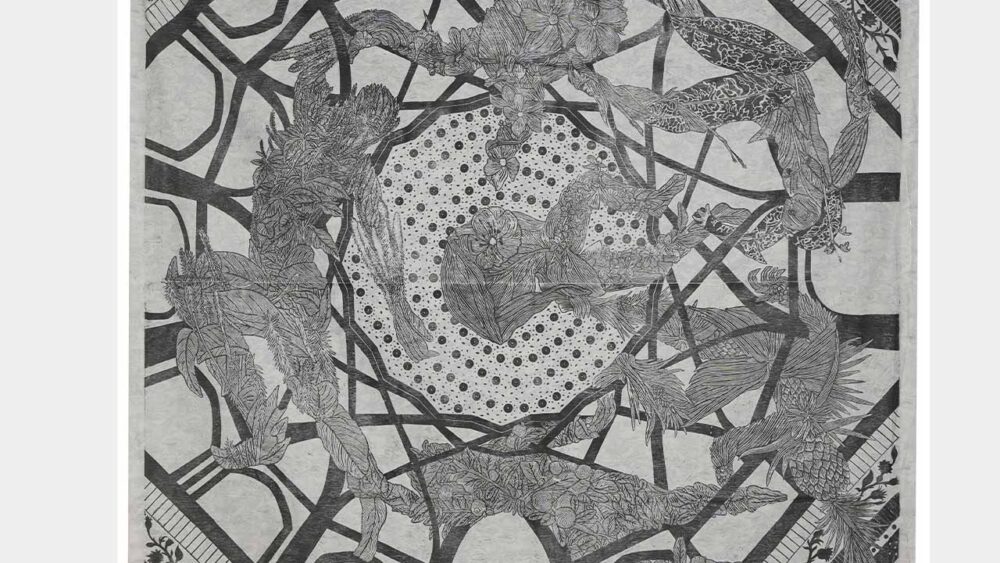
A CHAMPION AND MENTOR
Reyes grew up in New Brunswick, N.J., later lived in Central Florida and moved to Broward County about three years ago. He describes Fordham as “an integral part of the Broward Cultural Division,” who has championed his art and become a cherished mentor to him.
“We usually have long conversations over the phone, or she comes to the studio and offers her experience, which has been totally valuable to me,” says Reyes. “All her stories and what she does and how she navigates public art and all those different facets. So she’s kind of been like a consultant, maybe the best way to describe it for me.”
Reyes says Fordham has made an impact in how he handles his art as a business.
“She’s helped me navigate certain things in my art career that I might not be too versed in: the business side of the arts, negotiations, that type of stuff . . . She’s just been an arts resource on top of being an amazing person.”
Broward’s Public Art & Design program began in 1976, “with the vision of beautifying a rapidly-developing Broward County,” according to a county website.? “We administer an average of 80 art projects annually, including conservation projects.” There currently are more than 310 public artworks on view throughout Broward.
The program, which provides over $6 million in annual support for cultural organizations and artists, now extends into municipalities throughout Broward and Fordham has been at the center of that expansion.
“The other thing that we started, that Leslie was so great at, is to work with cities and help them create their own public art programs,” says Dunlap. “Leslie has led our public art teams in the creation of Dania Beach’s public art master plan. She’s currently finishing up the same with the city of Wilton Manors.”
Among the impressive public artworks commissioned during Fordham’s tenure:
- Alice Aycock’s white and blue “Exuberance” is displayed in a Port Everglades traffic circle outside Cruise Terminal 25, which is primarily used by Celebrity Cruises (also known for its white and blue colors). The sculpture, budgeted at $495,000, was completed in 2019.
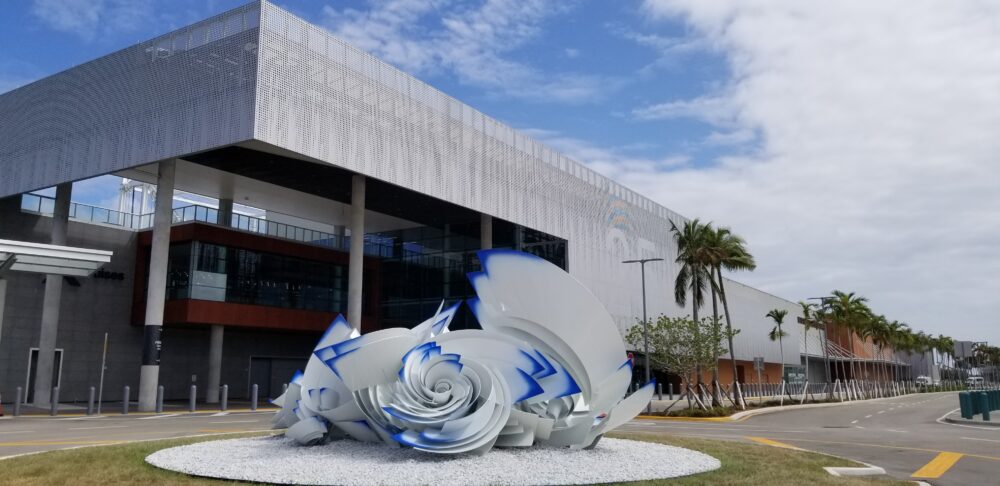
- “Walking Sticks with Stories to Tell” (2019) by artist Claudia Fitch. The $220,000 sculptures are on display near the African-American Research Library and Cultural Center, 2650 Sistrunk Blvd., Fort Lauderdale.
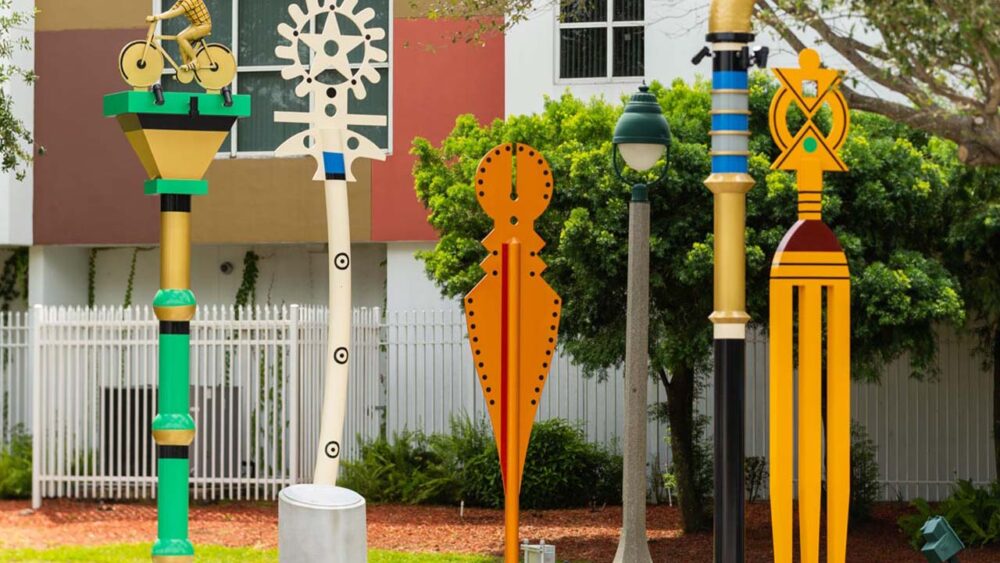
- “Tidal School” by Project One Studio, a $200,000 243-foot-long sculpture of painted aluminum and galvanized steel on grass plantings soon to be completed at 19th Avenue and Eller Drive in Port Everglades.
- An in-the-works $6 million color lighting project for the E. Clay Shaw Jr. Bridge, also known as the 17th Street Causeway bridge, which crosses the Intracoastal Waterway east of the Broward County Convention Center. “That’s our biggest project yet,” says Fordham.
The public art program is a mix of visual and audio works, some obvious and others more discreet.
Fort Lauderdale-Hollywood International Airport contains examples of each.
“At our airport, we’ve got a couple of sound art pieces,” Fordham says. “You might hear bird noises. You might hear the sound of waves. You might hear a person’s voice saying, ‘You look beautiful today.’”
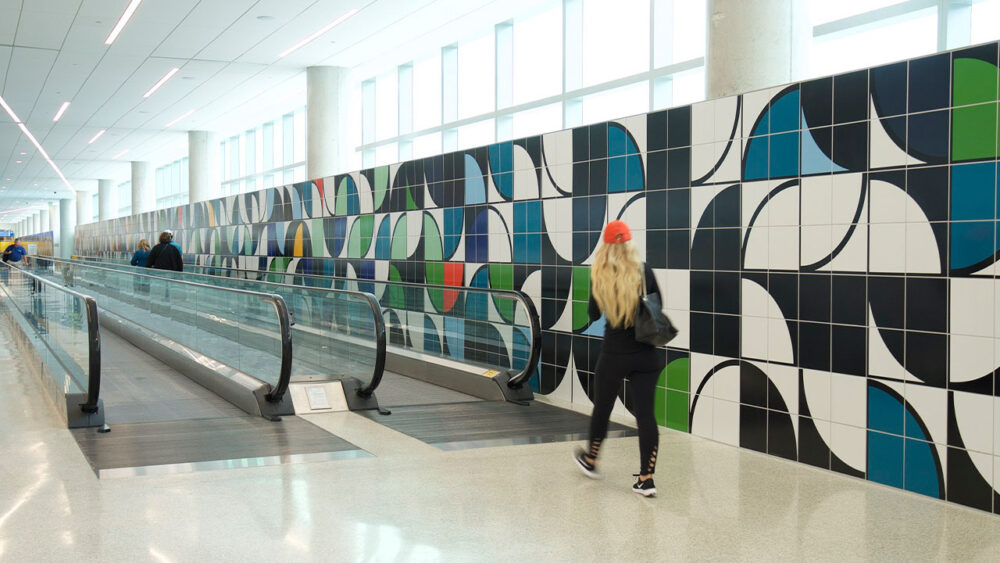
Fordham herself recently was startled by one of her own acquisitions. “A couple of months ago, I had a 6 a.m. flight, and I was walking through a corridor where we had some sound art. I jumped, thinking, ‘Who was that who just said that to me?’”
Some art sounds are meant to be more pleasant than the typical noises heard in busy airports.
“If you’re standing waiting for your luggage, we have something called ‘musical warning beacons.’ Instead of just the usual sound you might hear to alert you that the conveyor belt is going to start moving, you have a musical warning rather than the glaring ‘beep, beep, beep.’”
‘FUNCTIONALLY INTEGRATED’
Public art displays are often “functionally integrated,” she says, and sometimes so subtle they might be overlooked as art, such as designed terrazzo floors at the Convention Center and Broward property appraiser’s office.
“You’re not always going to stop and say, ‘Oh wow, that’s an amazing sculpture.’ You’re going to be walking across something that’s feeling pretty great and subliminally, potentially, you’re going to be feeling great because you’re not walking on the cracked sidewalk. You’re now walking on a lovely artist-designed floor that might be colorful, that might have text in it, imagery. Those are the kind of things that just make our lives richer.”
As her retirement approaches, Fordham ponders what’s next.
“After the stress of the job is cleared a little bit and I can see the future coming, I really don’t want to divorce myself from the arts,” she says.
She’s pondering taking her skills and putting them to use as an advisor, perhaps.
“I’d like to explore the idea of advising others on their acquisition and purchase of art. I also care very much about public spaces and what art can do in the public space. If I can be involved in that – perhaps not in the municipal sense where I’m advising cities anymore – but advising other types of organizations that put art in public places, I would very much like to do that.”
She’s also looking forward to just having the time to enjoy retirement.
“I have all the usual plans: traveling and playing. I’ve been learning French for the last four years, and I’m not finished learning that. I have some house renovations planned, as well,” says Fordham, who lives in Fort Lauderdale.
By the way, she has no plans to resume sewing. “But I’m really interested in some Japanese embroidery and Japanese bags. Perhaps I’ll have time to do some of that when I retire.”
This story was produced by Broward Arts Journalism Alliance (BAJA), an independent journalism program of the Broward County Cultural Division. Visit ArtsCalendar.com for more stories about the arts in South Florida.

